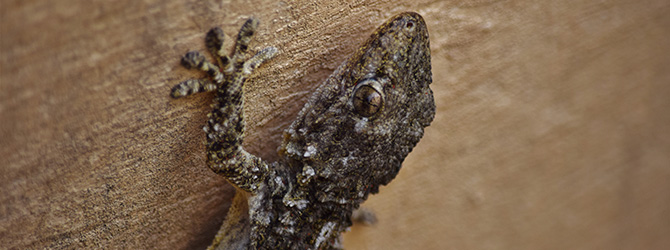Gecko health problems: symptoms and causes
Most gecko species are generally friendly, easy-to-care-for creatures, and any changes in behaviour or eating patterns are likely to be a sign of a sick gecko.
If you suspect your gecko is suffering from any of the conditions below, make an appointment with your specialist reptile vet.
Impaction
The number one health problem in geckos is impaction, which can be fatal if left untreated. It’s caused when geckos eat something they can’t digest, such as sand in their tank or vivariums or a food item that’s too big for their gut.
Internal parasites in geckos
Internal parasites can be passed on by contact with infected geckos, or from eating poor quality food. Symptoms include regurgitation/vomiting, loss of weight/condition (often geckos’ tails become much thinner if they have parasites as it’s one of the places they store fat) loss of appetite and lethargy. Your specialist reptile vet maybe able to prescribe a worming treatment or medication to eliminate them.
Chest/respiratory infections
If the temperature in your tank/vivarium are inappropriate for that species, your gecko will get sick. For this reason, it’s important to monitor the temperatures in your tank/vivarium using a reptile type thermometer regularly, during the day and at night to make sure your heat source is working correctly. Keep a note of these temperatures as the vet will ask you about them if you do need to take your gecko to the vets.
Signs of a chest/respiratory infection in your geckos include lethargy, loss of appetite and difficulty breathing (maybe breathing with their mouths open).
If your gecko displays any of these symptoms, pop your pet along to your specialist reptile vet, for an examination and they may prescribe some treatment if needed.
Shedding problems
A healthy, happy gecko regularly sheds and in most cases eats its skin – but problems with shedding can occur. Signs of difficulty shedding include sheets of shed clinging to your gecko’s toes and feet, head, or tail. This excess shed can damage your gecko’s extremities and can cause them to lose toes and can be very painful, so it must be very carefully removed. You can do this by soaking or spraying the affected area with warm water to soften the shed, then gently peeling it off. Most gecko species will need a humid hide box that is kept damp that they will go in when they are ready to shed their skins.
Tail shedding
Some species of geckos when they get frightened can shed their tails as an escape mechanism. As the tail is an important store of fat for your gecko, this can leave his health vulnerable, so try to avoid anything that’s likely to cause your gecko stress, such as sudden loud noises or vibrations and never pick up or hold your gecko by its tail.
If your gecko does shed its tail, don’t worry – it will regenerate (sadly the regrown tail never looks as good as the first tail). In the meantime, keep the tank at the right temperatures, and make sure your reptile is well fed and watered during the time it takes to grow back.
Metabolic bone disease/disorder
In the wild, geckos get vital exposure to vitamin D3 from sunlight. Your pet gecko gets a daily dose through UVB lighting, or in powdered form, along with calcium and other vitamins.
A diet that’s low in calcium and vitamin D3 can lead to soft, rubbery bones that can’t support your gecko’s weight. This condition is known as metabolic bone disease/disorder (MBD), the main symptoms of which are distorted limbs and difficulty raising the body off the ground.
MBD is relatively easy to prevent – just be sure to feed your reptile a diet rich in calcium and vitamin D3. Dusting your pet’s daily dose of insects with calcium before feeding can help with this.
“If your gecko sheds his tail, keep his tank at the right temperature, and make sure he’s well fed and watered during the time it takes to grow back.”
Signs that your gecko needs veterinary care
Contact your specialist reptile or exotics vet if your gecko displays any of the signs or symptoms below:
- Respiratory problems
- Prolapses from the cloaca
- Drooping head or limbs
- Gaping mouth
- Thinning tail
- Lethargy and weakness
- Vomiting/regurgitation
- Loss of weight or condition
- Detectable lumps or swelling
- Discharge from the eyes or nostrils
Want more information on gecko illnesses?
For expert advice on gecko health problems, speak to a specialist reptile or exotic vet.
Find your nearest vet using our Find a Vet page, or speak to a vet online using Online Vets.

